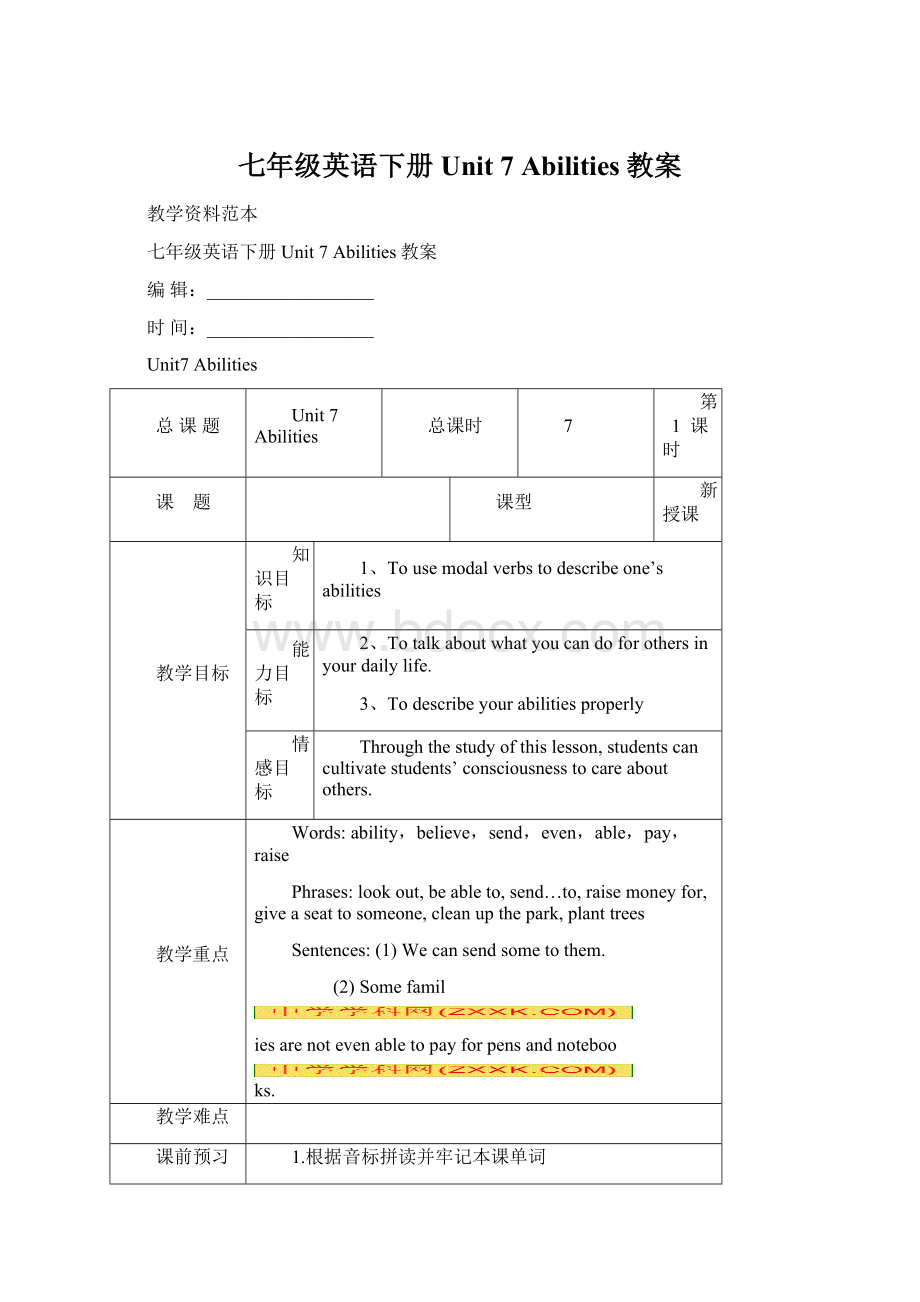七年级英语下册 Unit 7 Abilities教案.docx
《七年级英语下册 Unit 7 Abilities教案.docx》由会员分享,可在线阅读,更多相关《七年级英语下册 Unit 7 Abilities教案.docx(18页珍藏版)》请在冰豆网上搜索。

七年级英语下册Unit7Abilities教案
教学资料范本
七年级英语下册Unit7Abilities教案
编辑:
__________________
时间:
__________________
Unit7Abilities
总课题
Unit7Abilities
总课时
7
第 1 课时
课 题
课型
新授课
教学目标
知识目标
1、Tousemodalverbstodescribeone’sabilities
能力目标
2、Totalkaboutwhatyoucandoforothersinyourdailylife.
3、Todescribeyourabilitiesproperly
情感目标
Throughthestudyofthislesson,studentscancultivatestudents’consciousnesstocareaboutothers.
教学重点
Words:
ability,believe,send,even,able,pay,raise
Phrases:
lookout,beableto,send…to,raisemoneyfor,giveaseattosomeone,cleanupthepark,planttrees
Sentences:
(1)Wecansendsometothem.
(2)Somefamil
iesarenotevenabletopayforpensandnoteboo
ks.
教学难点
课前预习
1.根据音标拼读并牢记本课单词
2.通过预习,你能准确写出下列单词吗?
能力_________相信__________ 座位__________甚至_________发送__________付费__________ 笔记本________ 募集__________
3.翻译下列句子
(1)信不信由你!
(2)我们可以寄一些衣服给贫困地区的孩子们。
(3)请把公园打扫干净。
教学过程
Step1Showingthelearningaims
Step2Leadin--Guidingmaterials
Showingashortdialogue
Step3.Free-talk
ShowsomepicturesofSupermanandSpidermantotheSsandask:
Whoishe?
Whatcanhedo?
/
WhatabilitiesdoesSuperman/Spidermanhave?
Doyouwanttoflylikehim?
Step4.Presentation
Whoishe?
Whatdoeshethinkhecando?
Doyoubelievehim?
2. PlaythetapeandmakeSsanswerquestionsrelatedtothecontent.
3. AskSstoread
Step5.Brain-storming
1.PreparesomequestionsforSstoanswer:
Wouldyouliketohelpothers(teachers/friends/familymembers)?
Whatcanyoudoforothers(teachers/friends/familymembers)?
Step6.Presentation
PresentthepicturesofPartAanddiscussthemwithSs.AskSsquestionsaboutwhattheygetfromthesepictures.
Step7.Drills
1. SsreadinformationgiveninPartAandfinishexercise.
2. DoC-Etranslationsaccordingtothecontentofsixpictures.
Step8.
Presentation
1. PlaythetapeofPartBandasksomequestionsrelatedtoit.
(1) Who’lltheyhelp?
(2) What’lltheydoforthechildren?
2. SsreadPartBafterthetapetogether.
Step9.Pair-work
1. SsusetheconversationinPartBasamodelandtalkaboutwhattheycandoinHelpingHandsClub.
2. Encourageseveralvolunteerstoactoutthedialogueinclass.
备课札记
1. cleanup打扫,清理
(1) Pleasecleanuptheclassroomafterschool.
(2) Yourroomisdirty.Youshouldcleanitup.(代词放中间)
2. giveaseattosb./giveseatstosb.给某人让座
3
. sendsb.sth.=sendsth.tosb.把某物发送给某人
4. be
ableto+动词原形(相当于can)
beableto可用于各种时态通常表示人的能力
IwasabletoswimwhenIwas5yearsold.
can既可表示能力也可表示可能性但只用于现在时和过去时中
HecanspeakChineseandEnglish.
5. payforsth.为…付款
pay+钱+forsth.付…钱买某物
当堂反馈
翻译句子
1)你会种树吗?
不会。
2)我们将为希望工程募集东西。
3)李明正在给别人让座。
4)三班的学生昨天探访了老年公寓。
5)我们可以为贫困儿童募集一些资金。
教学反思
Content
7BUnit7AbilitiesReading
Teachingaims
Knowledgeaims
1、Tolearnsomenewwordsandphrasesinthispart
2、ToknowabraveyoungmancalledLinTao
Abilityaims
2、Toknowsomethingaboutfireandhowtodealwithitcorrectly
Emotionaims
1.Tobecarefulwithfire
Teachingfocus
3、1、Tolearnsomenewwordsandphrasesinthispart
ToknowabraveyoungmancalledLinTao
Teachingdifficulties
2、Toknowsomethingaboutfireandhowtodealwithitcorrectly
Teachingmethods
student-centeredmethod,
groupwork
Teachingaids
Multimedia
Teaching
steps
Step1Showingthelearningaims
Step2Leadin--Guidingmaterials
Showashortarticleaboutfire
Step3.Presentation
1.DopartB1onpage83.
2.Checktheanswer.
Step4.Listening
1.Listentotextandanswerthequestions:
1)Who’sthebraveyoungman?
2)Didthefireburntheyoungman?
2.Listenagainandanswermorequestion.
1)WhatdidLiuTaodoon10thMay?
Hesavedhisneighbourfromthefire.
2)Whycouldn’tMrsSungetoutherhousewhenitwasonfire?
Becauseshehurtherleg.
3)HowlongwasLiuTaoinhospital?
Hewasinhospitalfortwoweeks.
4)Firecanbedangerous.Whatshouldwedo?
Weshouldbecarefulwithfire.
Step5.Reading
1.ReadthearticlebythemselvesandfinishpartB2.
2.Scanthestory,trytotellT/F.
3.Putthemintotherightorder.
Step6.Discussion
Whatcanwelearnfromthestory?
Step7.Homework
1.Readaloudthearticleandunderlinethedifficultparts.
2.Rememberthenewwordsinthislesson.
Bbdesign
7BUnit7Abilities
Reading
(1)
Save..from
athomealone
hearsomeoneshouting
SelfReflection
Content
7BUnit7AbilitiesReading
Teachingaims
Knowledgeaims
1、Learnthelanguagepointsinthisarticle.
2、Learntotalkabouthowtobecarefulwithfire
Abilityaims
Trytoretellthisarticle
Emotionaims
Trytoarisethestudent’sawarenessaboutfire
Teachingfocus
Learnthelanguagepointsinthisarticle.
Learntotalkabouthowtobecarefulwithfire
Teachingdifficulties
Trytoretellthisarticle
Teachingmethods
student-centeredmethodgroupwork
Teachingaids
Multimedia
Teaching
steps
Teaching
steps
Step1Showingthelearningaims
Step2Leadin--Guidingmaterials
Showashortvideotoreviewhowtobecarefullwithfire
Step3.Presentation
1.DopartB2onpage85andpartB3onpage86.
2.Checktheanswer.
Step4.Presentation
1.showsomeimportantlanguagepointstothestudents
1.adj.+enough
enough修饰形容词通常放在其后面,修饰名词通常放在名词的前面。
e.g.Heisoldenoughtogotoschool. 他年龄足够大,可以去上学。
Ihavelotsofworktodoeveryday.我每天有大量的工作要做。
2.save…from 从……中救出
e.g.Hesavedaboyfromtheriver.他从河里救出了一个男孩。
3.alone=byoneself=onone’sown单独,独自
e.g.Heisathomealone/byhimself/onhisown.
他独自一个人在家。
4.hear/seesb.doingsth. 听到/看到某人正在做某事
e.g.Heheardsomeonesingingnextdoor.
他听到有人在隔壁唱歌。
hear/seesb.dosth.听到/看到某人正在经常做某事
e.g.Heoftenseesaboyplayingbasketballontheplayground.
他经常看到一个男孩在操场上打篮球。
5.A79-year-oldman 一位79岁的老人
e.g.Heisa79-year-oldman.
=Themanis79yearsold.
他是一位79岁的老人。
6.pour…over… 把……倾倒……
e.g.Hepouredmilkoverhisshirt.他把牛奶倾倒在他的衬衫上。
7.rushinto… 冲进……
e.g.Herushedintothefiretosaveaboy.
他冲进火里去救一个男孩。
8.putoutthefire=putthefireout扑灭火
9.inhospital 住院
inthehospital 在医院里
e.g. Hewasinhospitalforamonth.他住院一个月。
Heworksinthehospital.他在医院里工作。
10.givesb.sth.=givesth.tosb.给某人某物
e.g.Hegivesmeabook.=Hegivesabooktome.
他给了我一本书。
11.atthatmoment 在那时
12.havetimetodosth. 有时间做某事
e.g.Ihavetimetodomyhomework.
我有时间做我的家庭作业。
13.becarefulwith… 小心……
e.g.Wemustbecarefulwithfire.我们必须要小心火。
Step5.practice
1.trytoretellthisarticlewiththeirpartners
Step6.Exercises
Dotheexercises
Step7.Homework
1.Recitethisarticle.
2.Rememberthelanguagepointsinthislesson.
Bbdesign
7BUnit7Abilities
Reading
(2)
Enough+n
Adj+enough
SelfReflection
Content
7BUnit7AbilitiesGrammar
Teaching
aims
Knowledgeaims
1、Learntheusageofcan、couldandmay
2、Learntheageofwhat、howtoexpressstrongfeelings
Abilityaims
1、Trytousethegrammarpointsinthispartsimply
Emotionaims
1、Trytohelpthestudentstoexpresstheirfeeling
Teachingfocus
Learntheusageofcan、couldandmay
Learntheageofwhat、howtoexpressstrongfeelings
Teachingdifficulties
Trytousethegrammarpointsinthispartsimply
Teachingmethods
student-centeredmethod,
groupwork
Teachingaids
Multimedia
Teaching
steps
Teaching
steps
Step1Showingthelearningaims
Step
2Leadin--Guidingmaterials
Showashortquestiontoleadinlesson
Step3.Explanation
Using“can”/“could”totalkaboutability.
Weuse“can”totalkaboutpresentability.
Weuse“could”totalkaboutabilityinthepast.
e.g.Ican(cannot/can’t/cannot)swim.Whataboutyou?
Hecould(couldn’t/couldnot)danceinthepast.Whataboutyou?
2.Using‘can’,‘could’,‘may’andtotalkaboutpermission.
1)can与could
can常用于口语中,表示非正式的请求,请求对象一般是家人或朋友。
e.g.
—CanIborrowyourbike,Simon?
西蒙,我可以借一下你的自行车吗?
—Ofcourse.当然可以。
—CanIhavesomemilk,Mum?
妈妈,我可以喝点牛奶吗?
—Yes,youcan.好的。
2)could是can的过去式。
在口语中,could常用来代替can向对方更委婉地提出请求,用法上比can正式,可以用于向老师或长辈提出请求,这时could不表示过去,回答一般还是用can。
lease?
请问,我可以用一下你的电脑吗?
—Yes,youcan.可以。
—CouldIhandinourhomeworklater,MrLin?
林老师,我可以稍后交作业吗?
—No,youcan’t.不,不行。
2.may
may也可以用来征求对方意见,意为“可以”
相当于could,用法也比can更正式,更礼貌,一般用于向陌生人或所尊敬的人请求许可。
e.g.
?
—MayIaskyouaquestion?
我可以问你一个问题吗?
—Yes,please.可以,请问。
—No,youmaynot.不行。
Step4.Exercises
Askandanswerquestionsusing“can”or“could”.Trytomakedialoguesinpairs.
1._______youspeakJapanese?
2._______youplaythepianolastyear?
3._______youcoo
k?
5._______yourideabicyclewhenyouwereveryyoung?
6._______youunderstandEnglishTVprogrammesin20xx?
Step5.Presentation
Showsomepicturesandpresenttheusageof“whatandhowtoexpressstrongfeelings”.
Step6.Explanation
1.what引导的感叹句:
1)what+a/an+形容词+可数名词单数(+主语+谓语)!
2)what+形容词
+可数名词复数(+主语+谓语)!
3)what+形容词+不可数名词(+主语+谓语)!
2.How引导的感叹句:
1)How+形容词(+主语+连系动词)!
2)How+副词(+主语+行为动词)!
Step7.Exercises
1. Dotheexercisesonpage86.